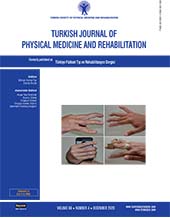Assessment of adult patients with cerebral palsy
2 Department of Physical Medicine and Rehabilitation, Istanbul Medeniyet University Goztepe Training and Research Hospital, Istanbul, Turkey
3 Department of Physical Medicine and Rehabilitation, Şırnak State Hospital, Şırnak, Turkey DOI : 10.5606/tftrd.2020.5614 Objectives: The aim of this study was to evaluate health problems, accommodation, and mobility of adult patients with cerebral palsy (CP).
Patients and methods: Between September 2018 and September 2019, a total of 70 adult CP patients (37 males, 33 females; mean age 29.4±10.2 years; range, 19 to 68 years) who were admitted to our clinic were included. Accommodation, education status, mental state, comorbidities, spasticity, contracture, deformity, and mobility of the patients were evaluated.
Results: Of the patients, 24.3% were diplegic, 21.4% were hemiplegic, 32.9% were tetraplegic, 15.7% were dyskinetic, and 5.7% had mixed form of CP. Among the patient, 38.6% had normal mental ability and 21.4% had severe mental retardation. A total of 92.9% of the patients were living with their family, 85.7% were unemployed, 10% were illiterate, and 21.4% had no health problems. Speech disorder was the most common health issue in 52.9% of the patients. Other health concerns included sensory problems, epilepsy, bladder/intestinal problems, nutritional problems, and respiratory and skin problems. The ratio of pain was 31.4%. Mild deformity was present in 54.3% of the patients, 43.7% were wheelchair-dependent, and 25.7% were Gross Motor Function Classification System (GMFCS) Level V.
Conclusion: Recognition and understanding health problems and living conditions of adult patients with CP would be useful both in determining the treatment goals of pediatric CP patients and in improving the quality of life of adult CP patients.
Keywords : Adult, cerebral palsy, function, locomotion, social

















